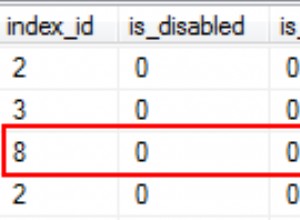A UNION le righe risultanti di tutte e tre le query, quindi scegli le 5 righe con il amount più alto :
(SELECT event_id, count(*) AS amount
FROM pageview
GROUP BY event_id
ORDER BY pageviews DESC, rand()
LIMIT 1000)
UNION ALL
(SELECT event_id, count(*)
FROM upvote
GROUP BY event_id
ORDER BY upvotes DESC, rand()
LIMIT 1000)
UNION ALL
(SELECT event_id, count(*)
FROM attending
GROUP BY event_id
ORDER BY attendants DESC, rand()
LIMIT 1000)
ORDER BY 2 DESC
LIMIT 5;
UNION ALL per conservare i duplicati.
Per aggiungere i conteggi per ogni event_id :
SELECT event_id, sum(amount) AS total
FROM (
(SELECT event_id, count(*) AS amount
FROM pageview
GROUP BY event_id
ORDER BY pageviews DESC, rand()
LIMIT 1000)
UNION ALL
(SELECT event_id, count(*)
FROM upvote
GROUP BY event_id
ORDER BY upvotes DESC, rand()
LIMIT 1000)
UNION ALL
(SELECT event_id, count(*)
FROM attending
GROUP BY event_id
ORDER BY attendants DESC, rand()
LIMIT 1000)
) x
GROUP BY 1
ORDER BY sum(amount) DESC
LIMIT 5;
La parte difficile qui è che non tutti gli event_id sarà presente in tutte e tre le query di base. Quindi assicurati che un JOIN non perde completamente le righe e le aggiunte non risultano NULL .
Usa UNION ALL , non UNION . Non vuoi rimuovere righe identiche, vuoi aggiungerle.
x è un alias di tabella e una scorciatoia per AS x . È necessario che una sottoquery abbia un nome. Può essere qualsiasi altro nome qui.
La funzione SOL FULL OUTER JOIN non è implementato in MySQL (l'ultima volta che ho controllato), quindi devi accontentarti di UNION . FULL OUTER JOIN unirebbe tutte e tre le query di base senza perdere righe.
Rispondi alla domanda di follow-up
SELECT event_id, sum(amount) AS total
FROM (
(SELECT event_id, count(*) / 100 AS amount
FROM pageview ... )
UNION ALL
(SELECT event_id, count(*) * 5
FROM upvote ... )
UNION ALL
(SELECT event_id, count(*) * 10
FROM attending ... )
) x
GROUP BY 1
ORDER BY sum(amount) DESC
LIMIT 5;
Oppure, per utilizzare i conteggi di base in più modi:
SELECT event_id
,sum(CASE source
WHEN 'p' THEN amount / 100
WHEN 'u' THEN amount * 5
WHEN 'a' THEN amount * 10
ELSE 0
END) AS total
FROM (
(SELECT event_id, 'p'::text AS source, count(*) AS amount
FROM pageview ... )
UNION ALL
(SELECT event_id, 'u'::text, count(*)
FROM upvote ... )
UNION ALL
(SELECT event_id, 'a'::text, count(*)
FROM attending ... )
) x
GROUP BY 1
ORDER BY 2 DESC
LIMIT 5;




